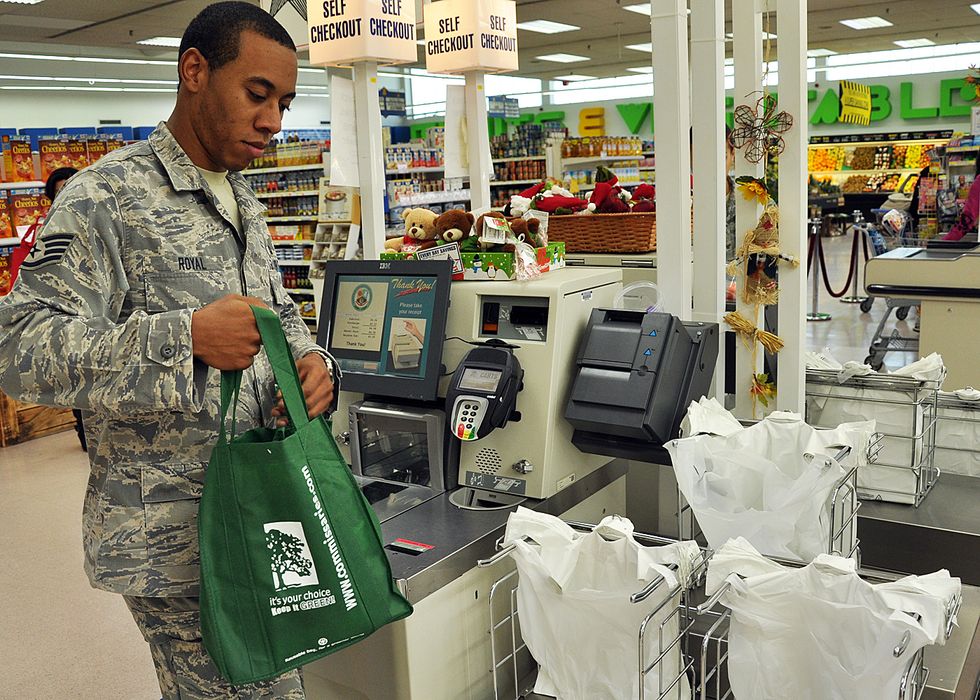As an engineer, I can appreciate the function and origin of the plastic "T-shirt" bag that took grocery stores by force in the 1960s. In 1965, Gustaf Thulin Sten revolutionized the way consumers carried home their groceries by creating a sturdy plastic bag with handles instead of the handle-less paper bags previously used by shoppers. This simple yet effective design is still being used more than 50 years later has undoubtedly maintained its hold due to its relatively inexpensive manufacturing costs and convenience to the stores and consumers.
Creativity and innovation should always be encouraged and valued. I am a strong proponent of this especially as an engineer who implements this mindset daily. Once the negative effects of an innovation are discovered, though, I also believe that it is the responsibility of engineers, government, businesses, and consumers to push for change to reduce and ultimately eliminate the negative effects on our society.
One area of improvement that is in desperate need of consumer action is the epidemic of plastic grocery bags.
It is no secret that these plastic bags are ending up in our oceans, beaches, lakes, landfills, and so on. There have been stories on the news, advocates speaking out on Facebook and other social media platforms about this growing issue, and even teachers educating their students in the classroom about how to "Reduce, Reuse, and Recycle."
This is all great because awareness is the first step to change, but this change is becoming a bit overdue. Limiting our consumption of plastic products is extremely difficult when grocery shopping since we are limited to the products offered to us on the shelves right in front of us. What we can control, though, is our use of plastic grocery bags at the last step of our shopping experience. There is nothing good that comes out of these plastic bags except the convenience it provides us as consumers. They make their way into landfills and bodies of water, innocent animals feed on the plastic and also feed it to their offspring, and our environment is rapidly deteriorating because of these plastic bags because of the toxins released into the land we grow our food on the water we drink from.
Fortunately, there are many people out there who want to do their part and reduce the negative impacts attributed to plastic bags.
But, unbeknownst to many consumers, plastic bags cannot be thrown in our blue recycling bins because they make their way to recycling facilities that do not have the processes or equipment to properly recycle them. Then what happens to these plastic bags? They still make their way into our landfills and oceans despite our best intent to make a conscious effort to save our planet. Some companies such as Walgreens have made a step in the right direction by providing plastic bag disposal bins in their stores, so consumers can bring in their plastic bags they have at home to be disposed of properly. While this is a great move on Walgreens' part, it is not a lasting nor sustainable solution.
The only way to eliminate plastic bag waste in our oceans and landfills is to stop using plastic bags to carry our groceries home. Instead, I urge every and all consumer to leave a bunch of reusable bags in their cars, grab them before walking into the store, and use them to carry out all your purchases. These bags typically range from $0.50 to $1.00 depending on where you purchase them from, and once you spend a couple bucks, you can use them over and over and over again.
Consumers directly impact business decisions and can directly cause businesses to stop sending plastic bags to their stores. Don't believe me? Business consultant Miranda Morley shares that "consumer behavior helps organizations decide what products and services to manufacture or offer." So, once more and more consumers start solely shopping with reusable bags, stores will no longer see the need to provide as many plastic bags to their customers and will produce and ship less plastic bags to their stores. This means that all the fish, turtles, birds, whales, and every other animal can live a life free from the threat of plastic, and us humans can live knowing that we aren't at risk for toxins seeping into our land and water.
You are just one person, but your actions matter. In fact, John F. Kennedy once said, "One person can make a difference, and everyone should try." Never underestimate the influence you have just because you are "one person." You may convince yourself that your actions are just one drop in the bucket, but once everyone contributes their drop to the bucket, we will have an ocean's worth of people making a difference and leaving a positive footprint on our planet.
So be the drop. I promise it will be worth it.

















